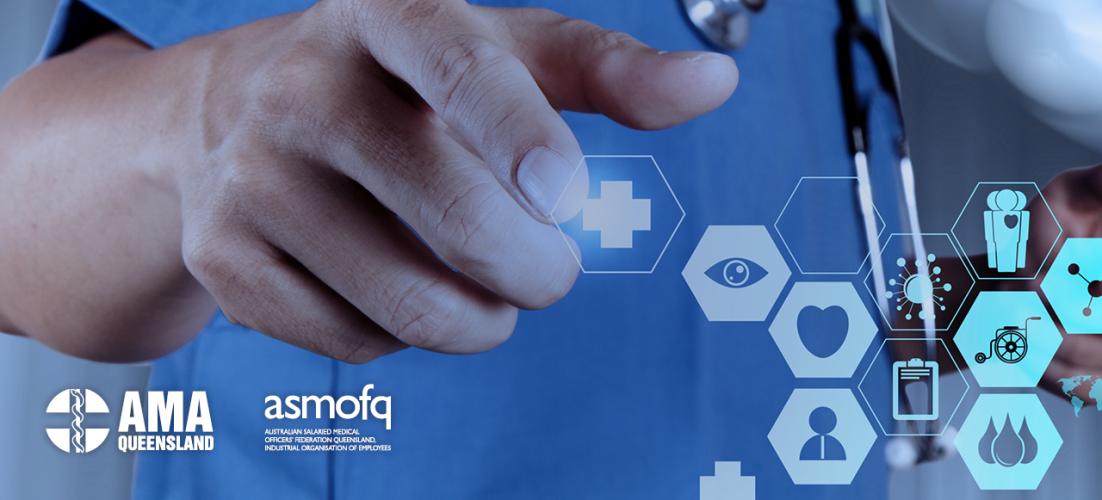Growing fear of fatigue-related medical mistakes

Rising numbers of pandemic weary junior doctors in Queensland fear exhaustion on the job will lead to making medical mistakes, according to results from AMA Queensland’s 2021 Resident Hospital Health Check (RHHC).
The issue was highlighted in the latest AMA Queensland public hospital report card, with 51 per cent citing fatigue due to working excessively long hours as a significant concern, up from 48 per cent in 2020 and 46 per cent in 2019.
AMA Queensland Council of Doctors in Training (CDT) and ASMOFQ (Australian Salaried Medical Officers’ Federation Queensland), surveyed 808 interns, house officers and other junior doctors to compare employment conditions in public hospitals across the state.
CDT Co-Chairs, Drs Robert Nayer and Natasha Abeysekera, said the upward trend revealed in this year’s results is a wakeup call from frontline health workers to our hospital system.
“Every year more and more doctors in training raise this as a key concern and they need to be heard before their fears become a reality,” Dr Nayer said.
“Thirty per cent of survey respondents also told us they had felt unsafe at work this year, up from 27 per cent in 2020 and 22 per cent in 2019.
“In addition, a quarter of trainee doctors said they had not been paid for all the overtime they claimed, a quarter were advised not to claim additional hours and a quarter did not claim overtime for fear it could negatively affect their assessment.
“Those results are reasonably consistent, or slightly worse, than the numbers reported last year so for many hospitals it’s a cultural problem that’s been allowed to continue unchecked.”
Dr Abeysekera said there had been a small increase in the rates of bullying, discrimination and sexual harassment in Queensland’s public hospitals over the past couple of years, but a noticeable drop in satisfaction with the way these incidents were handled.
“Just over a third of junior doctors have personally experienced these abhorrent behaviours and 41 per cent said they had witnessed bullying, discrimination or sexual harassment in our hospitals,” she said.
“There was an increase in reporting rates from 23 per cent in 2019 to 32 per cent in 2021, but a substantial drop in the number who felt the incident had been appropriately addressed, down from 46 per cent in 2019 to just 34 per cent this year.
“Worryingly, 71 per cent of respondents were concerned that there might be negative consequences for reporting this year compared to 55 per cent in 2019.”
Dr Nayer said the pandemic had added additional pressures on clinical staff and more than ever, hospitals needed to provide a safe, supportive environment for junior doctors.
“They are essential workers and we need to train and retain the next generation of doctors in workplaces where they are respected and appreciated, so that they in turn can provide excellent patient care,” he said.
“These trainee doctors are working exceedingly long hours, often in a very stressful environment, and this can leave some members of the profession vulnerable to anxiety and depression. We do not want to see anyone exit the profession early, due to inadequate safeguards and support.”
CDT Wellbeing Portfolio spokesperson, Dr Chris Erian, said AMA Queensland had requested an additional $1.97 million in the last State Budget to expand the Wellbeing at Work program but the funds have not yet been committed.
“The program aims to improve doctors’ mental health and workplace safety and we are calling on the Queensland Government to urgently re-examine the case for additional funding in the wake of these latest results,” Dr Erian said.
“We have been releasing the annual Resident Hospital Health Check since 2016 and we are simply not seeing the necessary improvement in key areas. It’s vital that we extend this program to cover all doctors who need this support.”
Dr Abeysekera said the pandemic had sparked a surge in membership enquiries, with an increasing number of medical professionals recognising the importance of giving a strong and united voice to the State’s peak medical body.
“Negotiations have already commenced on a new Medical Officers’ Certified Agreement (MOCA 6) with the aim of protecting and securing the wages and conditions of all Queensland Health Medical Officers, RMOs/Registrars and Senior Medical Officers,” she said.
“The current agreement with Queensland Health expires in June 2022 and both ASMOFQ and AMA Queensland want to see entitlements and conditions prioritised for our frontline health heroes.”
Find the full 2021 Resident Hospital Health Check results HERE.